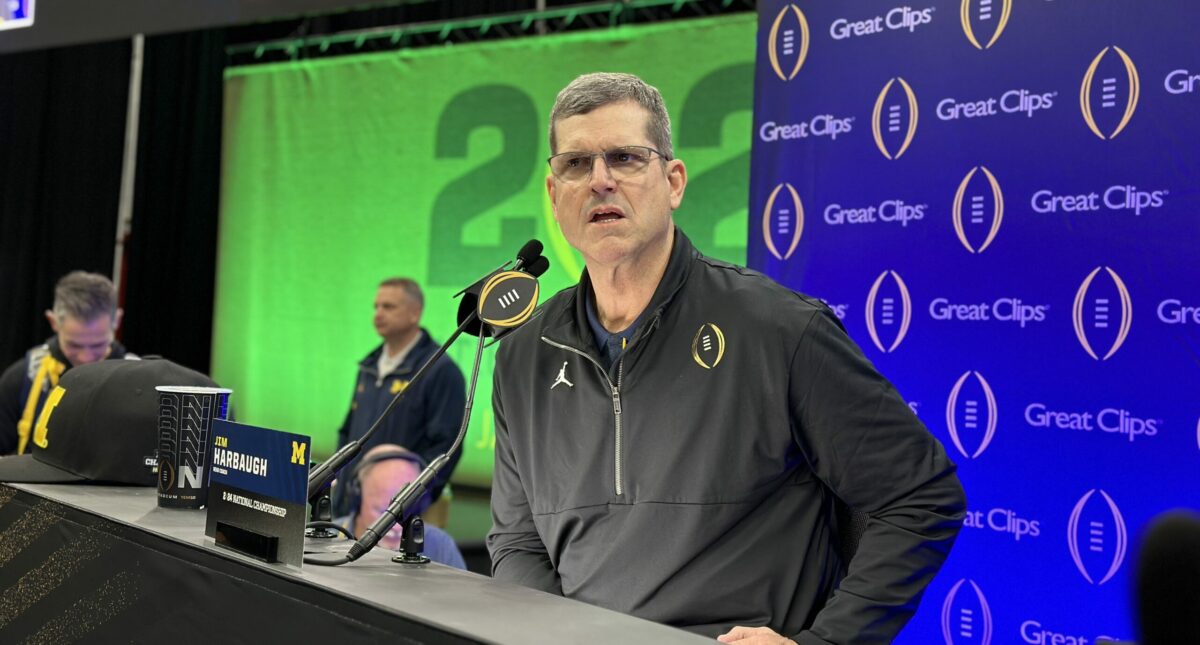
HOUSTON- The ongoing discussions about revenue sharing with student-athletes inside college athletics continues to be a tough conversation without many answers. In the current landscape, Michigan head coach Jim Harbaugh says we’re all ‘robbing the same train’ when it comes to profiting off athletes in all sports.
Taking the stage this weekend in Houston before his team takes the field on Monday night to play for a national championship, Jim Harbaugh tried to be a voice for college athletes. Now, whether or not folks are going to listen to these multi-million dollar head coaches is another battle within the entire NIL system.
As we’ve seen over the years, contracts for coaches are meant to be broken and massive buyouts come with the territory in this age of massive deals without consequences. While college athletes are the driving force behind television ratings and advertising dollars, coaches are trying to say the right things about being paid, after they sign insane contracts built off the success of the players.
But at the end of the day, folks don’t want to hear from the coaches that are cashing-in on these huge contracts, with massive buyouts. Unfortunately for the student-athletes, they don’t have many people stepping up to the podium to fight for the right to share in the revenue.
Jim Harbaugh Talks Revenue Sharing For College Athletes
Obviously, if it weren’t for players like Blake Corum or Michael Penix Jr. these coaches wouldn’t have the opportunity to sign a contract extension for over $100 million. So there’s a fine line when it comes to taking these coaches at their word, or even listening to their complaints about the state of college athletics.
But when a coach like Jim Harbaugh says that athletes do not have a voice when it comes to the current landscape, he’s not wrong. While television networks cash-in on the athletes and their likeness on the college football playoff stage, the players are the ones missing out on the increased revenue.
“The one I can’t figure out is why the players aren’t sharing in the revenue, why that change hasn’t occurred,” Jim Harbaugh wondered aloud. “People come to watch the players. They really don’t come to watch the coaches, don’t come watch the administrators. They come to watch the players.
“And in a world where the revenue is ever growing, the student-athletes being able to participate in that ever-growing revenue, who could argue against them? When’s that going to change? When is everybody going to start using their voice to say, hey, this is wrong; this isn’t right?”
While we can discuss this topic until we’re all blue in the face, the players are the ones who are in this fight without a voice of their own representing them.
“There’s guys out here not even getting paid minimum wage,” Harbaugh continued. “And I’m not talking about just football players. I’m talking about all student-athletes that need to participate. The talent needs to participate in the ever-growing share of the revenue. I’d like to see that change..
“The organizations, conferences, universities, NCAA, they’re well-represented. They have legal firepower at every angle. And the student-athletes, they don’t have a voice; they’re not represented in any way, and that needs to change, too.”
Outside Of NIL, Not Much Change Since The 80’s According To Harbaugh
If we put aside NIL, we are still living in the same world of college athletics that players from the 80’s were dealing with, at least according to Jim Harbaugh. When it comes to revenue sharing from television contracts that networks are thriving off of, there certainly hasn’t been a change.
As for NIL, that is a completely different topic than the one of revenue sharing, especially when most athletes on a roster aren’t prospering from the new method for paying players.
“They’re getting the same amount as I got in the ’80s. You’re getting a scholarship, room, board, books and tuition. So it’s like, come on, man, let’s do the right thing here. And who is that voice? I don’t know that. Who is the voice for the student-athletes? But you’ve got the organizations that are really fighting for their share and their piece, and it’s time to share.
“I would say this, anyone who is profiting from the student-athletes right now — myself included — coaches, somewhere between 5 and 10 percent, take 5 to 10 percent less. That would go for any administrator, any coach, any conference, any university, NCAA — 5 to 10 percent less and maybe a 10 percent tax from the television stations, into one pot for the student-athletes. Maybe that’s a start.”
At the end of the day, the cog on the wheel will continue to be the student-athlete. While millions of people tune into the national title game on Monday night, not a single player from either roster will see a dime from the revenue generated from the game.
For that alone, Jim Harbaugh is doing his best to advocate for the players, even if he might not be around the sport this time next year.
“There’s a lot of people profiting off the backs of student-athletes, and they do a lot of work to keep it from them.”
